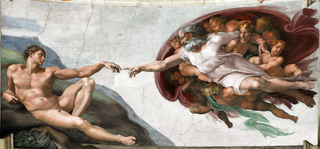Jared is a given name of Biblical derivation.

Adam is a common masculine given name in the English language, of Hebrew origin.
Jamie is a unisex name. Traditionally a masculine name, it can be diminutive form of James or, more rarely, other names and is of Scottish Gaelic origin. It is also given as a name in its own right. Since the mid-20th century it has been used as an occasional feminine name particularly in the United States.
The surname Collins has a variety of likely origins in Britain and Ireland:
- English and Scottish: A patronymic surname based on the English and Scottish name Colin, an English diminutive form of Nicholas.
- Norse: From the Old Norse personal name "Kollungr", a form of "koli" which in Old English became 'Cola', meaning swarthy or dark.
- Irish: The medieval surname was Ua Cuiléin, which has usually become Ó Coileáin today.
- Welsh: Collen; "hazel, hazel grove".
Allen is a Celtic surname, originating in Ireland, and common in Scotland, Wales and England. It is a variation of the surname MacAllen and may be derived from two separate sources: Ailin, in Irish and Scottish Gaelic, means both "little rock" and "harmony", or it may also be derived from the Celtic Aluinn, which means "handsome". Variant spellings include Alan, Allan, etc. The noble family of this surname, from which a branch went to Portugal, is descended of one Alanus de Buckenhall.

Aaron is an English masculine given name. The 'h' phoneme in the original Hebrew pronunciation "Aharon" (אהרן) is dropped in the Greek, Ἀαρών, from which the English form, Aaron, is derived.
Douglas, Doug or Dougie Smith may refer to:
Derek is a masculine given name. It is the English language short form of Diederik, the Low Franconian form of the name Theodoric. Theodoric is an old Germanic name with an original meaning of "people-ruler" or "lead the people".
Corey is a masculine given name and a surname. It is a masculine version of name Cora, which has Greek origins and is the maiden name of the goddess Persephone. The name also can have origins from the Gaelic word coire, which means "in a cauldron" or "in a hollow".
Joe is a masculine given name, usually a short form of Joseph.
The surname Burns has several origins. In some cases, it derived from the Middle English or Scots burn, and originated as a topographic name for an individual who lived by a stream. In other cases the surname is a variant form of the surname Burnhouse, which originated as a habitational name, derived from a place name made up of the word elements burn and house. In other cases the surname Burns originated as a nickname meaning "burn house". In other cases, the surname Burns is an Anglicised form of the Irish Ó Broin, which means "descendant of Bran". In some cases the surname Burns is an Americanized form of the Jewish surname Bernstein, which is derived from the German bernstein ("amber").
Ferguson is an Anglicization of the Scots Gaelic "Macfhearghus", a patronymic form of the personal name Fergus which translates as son of the angry (one).
Dean is an English masculine given name and middle name with several origins:
Grant is an English given name derived from the French grand meaning 'tall' or 'large'. It was originally a nickname given to those with remarkable size.
Jake is a masculine given name derived from Jacob. It can also be a nickname of Jacob and various other given names.
The Iceman or Iceman is a nickname of:
Quinn is an Anglicised form of the Irish Ó Coinn or Mac Cuinn. The latter surname means "descendant of Conn". The surname Quinn is also rendered Ó Cuinn or Mac Cuinn in Irish. The surname is borne by several unrelated families in Ireland, especially in the northern province of Ulster and also the counties of Clare, Longford, and Mayo. According to the historian C. Thomas Cairney, the O'Quins were part of the Conmaicne Rein tribe in Ireland who came from the Erainn tribe who were the second wave of Celts to settle in Ireland from about 500 and 100 BC. The most notable family of the name are that of Thomond, a Dalcassian sept, who derive their surname from Niall Ó Cuinn who was slain at the Battle of Clontarf in 1014. This family was formerly represented by the Earls of Dunraven. Another family is that seated in Annaly, who were related to the O'Farrell lords of Longford. Another Quinn family was seated at An Chraobh, County Tyrone and they were related to the O'Neill Kings of Tír Eoghain and for whom they acted as Hereditary Quartermasters. Other families include one seated in Antrim; one seated in Raphoe; and one called Clann Cuain, seated near Castlebar. In the seventeenth century, the surname Quinn was common in Waterford. In 1890, the surname was numerous in Dublin, Tyrone, Antrim, and Roscommon. Quinn is one of the twenty most common surnames in Ireland. The surname Quinn is sometimes associated with Catholics, while Quin is associated with Protestants.
Blake is a primarily male given name which originated from Old English. Its derivation is uncertain; it could come from "blac", a nickname for someone who had dark hair or skin, or from "blaac", a nickname for someone with pale hair or skin.
This page is based on this
Wikipedia article Text is available under the
CC BY-SA 4.0 license; additional terms may apply.
Images, videos and audio are available under their respective licenses.
